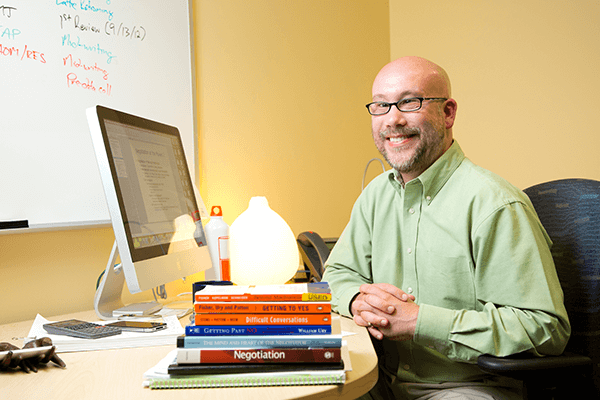UM-Flint Professor Researches Work/Life Balance

A UM-Flint professor is exploring what drives people to overwork and how it may influence their private lives. This research may help employers create a healthy and productive workplace atmosphere.
Associate Professor of Management Gregory Laurence will highlight these questions of work-family conflict and dynamics at an international conference later this month in Japan.
Laurence is part of a team of researchers from Japan, the United States, and Korea, who are leading a symposium at the International Congress of Psychology in Yokohama, Japan, July 24-29.
The group will present several papers about work culture, tested in the United States, China, Finland, Germany, Japan, and South Korea.
Laurence's research analysis, which he is currently finalizing, delves into whether enjoyment of work or compulsion to work drives people to work extended hours; and if this matters in whether working long hours effects family life.
Participation in the conference should help Laurence further build on his extensive catalog of employee well-being and workplace culture research and extend the university's international academic connections.
"The is one of a handful of major international psychology conferences on the conference circuit and so represents an opportunity to get feedback on my research from top flight researchers from around the world," he said. "The exposure UM-Flint gets from my team hosting a symposium at the conference should be measurable."
Laurence, chair of the Department of Management and Marketing within UM-Flint's School of Management, has published nine articles in peer-reviewed journals that relate to workplace issues, such as employee stress, what influences this stress, and what are the results of this stress. He has examined issues such as how and why people decorate their work space, and how stress at work impacts obesity. Laurence has presented at 14 international conferences, building a network of research partners.
Laurence and his team have collected survey data from 3,600 people for their latest research, with his peers looking into issues as depression, leadership, and teamwork. The surveys not only look into how work life negatively and positively influences family life, it also looks into how family life effects a person's job.
The answer may vary depending on the country's culture, he said, but also possibly more significantly, the culture of a particular workplace. Peer influence, management expectations or guilt can drive someone to overworking.
In the long run, this may be damaging to both the person, the person's family, and the company, Laurence said.
"There are some real benefits to companies if they are thinking long term about not overworking employees," he said. "If you have an employee and they have really high work-family conflict, and they quit, what does that cost you to replace them? It costs you a lot."
His research, along with those in his field, may give employees more data and insight on how to provide an environment for a healthy work-life balance.
"Looking at our findings holistically, if working excessive hours is mostly strongly associated with organizational norms, and compulsion to work is most strongly associated with negative outcomes in terms of work-life balance, then American companies doing what they can to devise performance appraisal and reward systems that encourage enjoyment of work over compulsion to work seems as though it would be effective in changing organizational norms in ways that benefit workers and probably impact commitment to the organization," Laurence said.
He and his research partners' findings indicate the motivation to work long hours differs, depending on the country.
"In the U.S. and Germany, compulsion to work is associated with more hours working. In Finland, it is enjoyment of work that is associated with more hours working," Laurence said. "In Korea and China, enjoyment of work is actually associated with fewer hours working, which seems a bit paradoxical on its face, but might be explained by those who enjoy work being inclined to find more efficient ways of doing the work, thus reducing actual time spent. In Japan, it is the combination of the two motivations that is associated with more time at work."
Laurence said he has long been driven by understanding employee motivations. For example, when lunch hour strikes, why do some people stay working, eat in the office, or leave the area for their meal.
"Those that go out to lunch, if you ask them, there is a reason they do," he said. "Maybe they want to socialize with coworkers outside of work. Maybe they like to have physical separation from their work space during the day to decompress. Maybe they hate work and want to be away from it. There are all kinds of motivations. That has always had me curious."
Those curiosities, combined with his expertise, means Laurence plans on continuing to build on his growing collection of papers, conferences, and published research.
"You get to answer one question, but you also get to ask another question, which is then, more research," he said.
Editor's Note: This profile is the third in our Faculty Research Spotlight series, highlighting the research of University of Michigan-Flint faculty and its benefit for our community and our world. Learn more about research at UM-Flint at umflint.edu/research. To suggest a faculty research project to spotlight, contact UM-Flint staff writer Robert Gold at goldr@umfllint.edu.
Related Posts
No related photos.
UM-Flint News
The Office of Marketing & Communications can be reached at mac-flint@umich.edu.